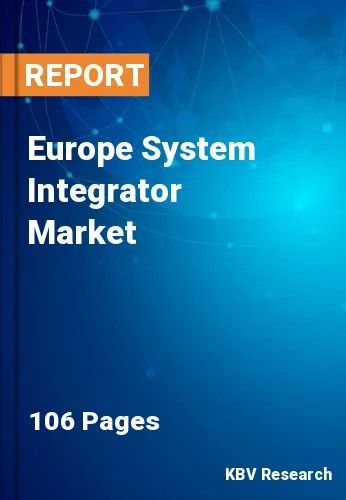The Europe System Integrator Market would witness market growth of 5.0% CAGR during the forecast period (2022-2028).
The job of systems integration generally starts with a client meeting, or a series of meetings, in which the systems integrator explores the client's business requirements and produces the technical requirements for an IT system that achieves those objectives. The framework for the integration process is laid out in the ensuing integration plan.
A customized architecture or application may be designed or constructed as part of that process, and it may then be integrated with brand-new or pre-existing hardware, pre-packaged software, and networking architecture. The systems integrator may now be necessary to combine on-premises IT systems with cloud-based software or computing infrastructure due to the growth of cloud computing.
Collaborating with a systems integrator on IT projects has several advantages, but their broad range of solutions, services, and capabilities is the main one. Numerous interrelated technical resources are used in many transformation initiatives nowadays, which may necessitate working with multiple vendors. A systems integrator, however, is qualified to handle each element, aiding vendor convergence in the process.
Few evaluations of the occupational health of the workforce have been conducted in Europe, despite having a considerable impact on the total semiconductor market. One instance is the UK, where the Health and Safety Executive (HSE) looked into a few of the health risks associated with working with semiconductors in two small studies. It will be essential to take into account the quality and skill of the staff in order to get a competitive advantage. In order to develop unique business models and ever-more complicated products, businesses would need to put a lot more effort into forming multidisciplinary teams.
The Germany market dominated the Europe System Integrator Market by Country in 2021, and would continue to be a dominant market till 2028; thereby, achieving a market value of $2,425.4 million by 2028. The UK market is anticipated to grow at a CAGR of 4.1% during (2022 - 2028). Additionally, The France market would exhibit a CAGR of 5.8% during (2022 - 2028).
Based on Technology, the market is segmented into Industrial Internet of Things (IIoT), Manufacturing Execution System (MES), Programmable Logic Controller (PLC), Supervisory Control and Data Acquisition (SCADA), Machine Vision & Machine Condition Monitoring, Human-Machine Interface (HMI), Distribute Control System (DCS), Functional Safety System, Plant Asset Management, Industrial PC and Industrial Robotics. Based on Service Type, the market is segmented into Hardware Integration Service, Software Integration Service and Consulting Service. Based on Industry, the market is segmented into Oil & Gas, Mining & Metal, Chemical & Petrochemical, Electrical & Electronics, Food & Beverage, Pharmaceutical, Automotive, Aerospace & Defense and Others. Based on countries, the market is segmented into Germany, UK, France, Russia, Spain, Italy, and Rest of Europe.
Free Valuable Insights: The Global System Integrator Market will Hit $37 Billion by 2028, at a CAGR of 5.4%
The market research report covers the analysis of key stake holders of the market. Key companies profiled in the report include ATS Automation Tooling Systems, Inc., Barry-Wehmiller Group, Inc., John Wood Group PLC, Avanceon limited, JR Automation (Hitachi, Ltd.), Tesco Controls, Inc. (United Flow Technologies), Burrow Global, LLC, Prime Controls, LP, Rockwell Automation, Inc. (MAVERICK Technologies, LLC), and INTECH Process Automation Inc.
By Technology
By Service Type
By Industry
By Country
Our team of dedicated experts can provide you with attractive expansion opportunities for your business.

